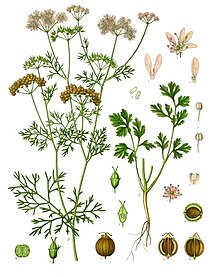Coriandrum sativum
| Coriander or cilantro | |
|---|---|
 |
|
| Scientific classification | |
| Kingdom: | Plantae |
| (unranked): | Angiosperms |
| (unranked): | Eudicots |
| (unranked): | Asterids |
| Order: | Apiales |
| Family: | Apiaceae |
| Genus: | Coriandrum |
| Species: | C. sativum |
| Binomial name | |
|
Coriandrum sativum L. |
|
| Nutritional value per 100 g (3.5 oz) | |
|---|---|
| Energy | 95 kJ (23 kcal) |
|
3.67 g
|
|
| Sugars | 0.87 |
| Dietary fiber | 2.8 g |
|
0.52 g
|
|
|
2.13 g
|
|
| Vitamins | |
| Vitamin A equiv. |
(42%)
337 μg
(36%)
3930 μg865 μg
|
| Thiamine (B1) |
(6%)
0.067 mg |
| Riboflavin (B2) |
(14%)
0.162 mg |
| Niacin (B3) |
(7%)
1.114 mg |
| Pantothenic acid (B5) |
(11%)
0.57 mg |
| Vitamin B6 |
(11%)
0.149 mg |
| Folate (B9) |
(16%)
62 μg |
| Vitamin C |
(33%)
27 mg |
| Vitamin E |
(17%)
2.5 mg |
| Vitamin K |
(295%)
310 μg |
| Minerals | |
| Calcium |
(7%)
67 mg |
| Iron |
(14%)
1.77 mg |
| Magnesium |
(7%)
26 mg |
| Manganese |
(20%)
0.426 mg |
| Phosphorus |
(7%)
48 mg |
| Potassium |
(11%)
521 mg |
| Sodium |
(3%)
46 mg |
| Zinc |
(5%)
0.5 mg |
| Other constituents | |
| Water | 92.21 g |
|
|
|
|
|
| Percentages are roughly approximated using US recommendations for adults. Source: USDA Nutrient Database |
|
Coriander (UK /ˌkɒrɪˈændər/;US /ˈkɔːriˌændər/ or /ˌkɔːriˈændər/;Coriandrum sativum), also known as cilantro (/sɪˈlɑːntroʊ/) or Chinese parsley, is an annual herb in the family Apiaceae. All parts of the plant are edible, but the fresh leaves and the dried seeds are the parts most traditionally used in cooking.
...
Wikipedia
